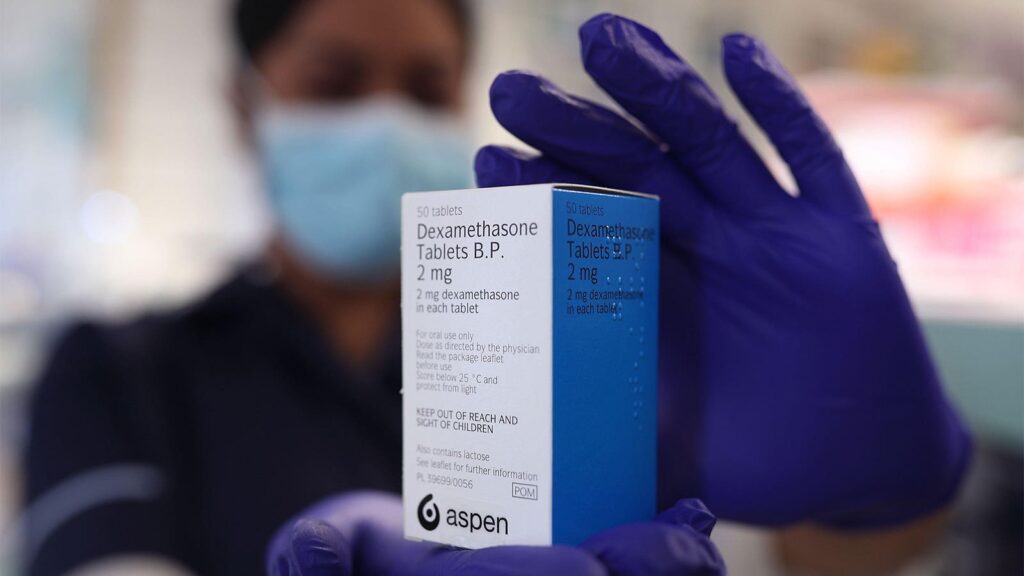Adding dexamethasone to treatment for tuberculous (TB) meningitis among heavily immunosuppressed HIV-positive patients in a low-resource setting did not significantly improve survival or confer any other measured benefits, a randomized controlled trial showed.
Among 520 HIV-positive adults in Vietnam and Indonesia who received a year of chemotherapy for TB meningitis, 44.1% of those who also received dexamethasone died during 12 months of follow-up compared with 49% of those who received placebo (HR 0.85, 95% CI 0.66-1.10, P=0.22), reported Joseph Donovan, PhD, of the Oxford University Clinical Research Unit in Ho Chi Minh City, Vietnam, and colleagues.
In fact, none of the subgroups from prespecified analyses benefited from dexamethasone, they noted in the New England Journal of Medicine.
Incidence of secondary endpoint events, such as immune reconstitution inflammatory syndrome during the first 6 months of treatment, was similar between the two groups.
Mortality can exceed 50% among HIV-positive patients with TB meningitis even with appropriate chemotherapy, often due to intracerebral inflammation. Ever since a 2004 trial of Vietnamese adults with TB meningitis showed improved survival from adjunctive dexamethasone, most treatment guidelines recommend glucocorticoids for all patients, regardless of HIV status.
Yet that trial only included 98 HIV-positive participants, with no subsequent research on steroid use specifically in HIV-positive patients with TB meningitis. Furthermore, several trials with HIV-positive patients who had other TB types found an increased risk of Kaposi’s sarcoma and other HIV-associated cancers from glucocorticoids.
The new findings “suggest that intracerebral inflammation in HIV-associated tuberculous meningitis may be qualitatively different from that in tuberculous meningitis not associated with HIV or that the mechanisms leading to death are different in HIV-positive persons and HIV-negative persons,” Donovan and team wrote.
William Schaffner, MD, of Vanderbilt University Medical Center in Nashville, Tennessee, told MedPage Today that these findings have “more global, international implications than national implications,” applying primarily to adults with HIV in the developing world, since most patients were substantially immune-compromised and U.S. patients usually have better-controlled HIV.
In an accompanying editorial, Sean Wasserman, MB, ChB, PhD, and Thomas S. Harrison, MD, of St. George’s University of London, called this trial “a monumental achievement in the context of a notoriously challenging disease to study.”
Despite the “impressive number of participants,” it’s possible a “smaller true effect from dexamethasone exists and was not identified,” they wrote, a possibility that only larger trials can resolve. Alternatively, dexamethasone may genuinely not benefit HIV-positive patients with TB meningitis, possibly due to subpar immune response.
Given that uncertainty, the variation in host responses to TB meningitis, and glucocorticoids’ bluntness as a tool, they proposed “a more targeted approach to immune modulation with therapeutics, such as tumor necrosis factor α blockers, and for specific clinical phenotypes,” while investigating other therapeutic targets in this population. Meanwhile, given the lack of excess harm from glucocorticoids and the disease’s severity and high mortality, using glucocorticoids may still be justified, even if a modestly lower risk of death is possible.
Schaffner mostly agreed with that assessment, suggesting “you could still use steroids in the hope that there is a small benefit, but with the comforting knowledge that they’re not going to harm your patient in the short period of time that you give the steroids.” However, he added that the decision might also depend on how well controlled the HIV is and how immune-suppressed the patient is.
“If you are dealing with a more controlled patient, I would be inclined to give it,” Schaffner said. “If they are profoundly immunosuppressed, I think I would take this study at face value and say, I don’t think they’re going to help.”
He also emphasized the importance of expanding programs like PEPFAR (the U.S. President’s Emergency Plan for AIDS Relief) that can improve prevention by putting even more people with HIV on therapy.
“When you do that, then the risk of TB meningitis goes way down,” Schaffner said. “There are a number of other things that can be done to address the problem other than just giving people who have this terrible disease steroids.”
The trial’s 520 participants had a median age of 36 years, and 76.2% were men. They were randomly assigned to receive a 6- to 8-week tapering course of either dexamethasone or placebo in addition to 12 months of anti-tuberculosis chemotherapy.
The study population had substantial immunosuppression: 51.9% of those with available data had a baseline CD4 count of ≤50 cells/mm3, and 49% had never received antiretroviral therapy. Most (85%) of the participants met the criteria for advanced HIV disease. Six participants withdrew from the trial, and five were lost to follow-up.
In the dexamethasone group, 73% of participants had at least one serious adverse event compared with 75.5% of participants receiving placebo. These events included nervous system disorders (36.1% vs 44.7%, respectively), infection or infestation (22.8% vs 19.5%), metabolism or nutrition disorders (19.4% vs 23%), and respiratory, thoracic, or mediastinal disorders (14.8% vs 14.4%).
Aside from the possibility that a larger trial may show a smaller reduction in mortality, another study limitation was that 26.5% of participants received open-label glucocorticoids at some point during treatment, with similar timing and incidence in both treatment arms. Nevertheless, “the additional glucocorticoids may have obscured outcome differences between the two groups,” the authors wrote.
Disclosures
The research was funded by the Wellcome Trust.
The study authors and Schaffner had no disclosures.
Wasserman is a member of the scientific advisory board for BioVersys.
Primary Source
New England Journal of Medicine
Source Reference: Donovan J, et al “Adjunctive dexamethasone for tuberculous meningitis in HIV-positive adults” N Engl J Med 2023; DOI: 10.1056/NEJMoa2216218.
Secondary Source
New England Journal of Medicine
Source Reference: Wasserman S, Harrison T “Tuberculous meningitis — new approaches needed” N Engl J Med 2023; DOI: 10.1056/NEJMe2310262.
Please enable JavaScript to view the

